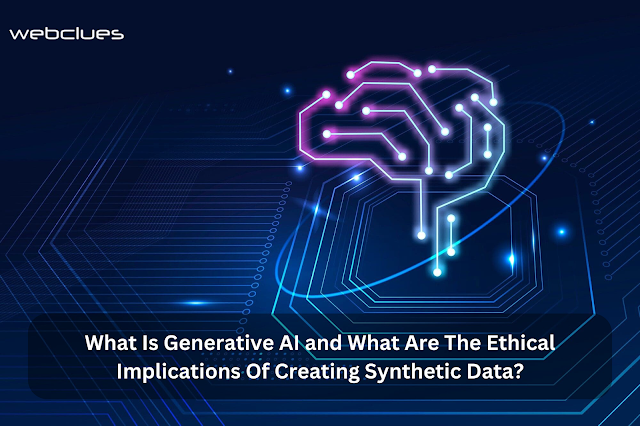In recent years, the field of artificial intelligence (AI) has witnessed significant advancements, particularly in the domain of Generative AI. GenAI refers to a class of algorithms and models designed to generate new, realistic data that resembles the patterns and characteristics of the training data it was exposed to. This technology has found applications in various domains, including image synthesis, text generation, and even the creation of synthetic data. While generative artificial intelligence holds immense promise for innovation and progress, it also raises ethical concerns, particularly in the context of synthetic data creation.
Understanding Generative AI:
GenAI encompasses a range of techniques and models that enable machines to generate content autonomously. One of the notable examples is Generative Adversarial Networks (GANs), where two neural networks, a generator and a discriminator, are pitted against each other. The generator creates synthetic data, and the discriminator evaluates its authenticity. This iterative process results in the generator producing increasingly realistic data, often indistinguishable from real data.
These generative models have been instrumental in diverse applications, from creating realistic images and deepfakes to generating human-like text and aiding in drug discovery. However, it is the creation of synthetic data that poses unique ethical challenges.
The Ethical Implications of Synthetic Data Creation:
Privacy Concerns:
Synthetic data is often generated by training AI models on real datasets, which may contain sensitive information. While the synthetic data itself may not directly reveal personal details, there is a risk that the underlying patterns learned from real data may inadvertently capture private information. This raises concerns about the potential misuse of synthetic data and the need for robust privacy safeguards.
Bias and Fairness:
GenAI models learn from the biases present in their training data. If the real data used to generate synthetic data contains biases, these biases can be perpetuated or even amplified in the synthetic data. This can lead to unfair and discriminatory outcomes when the synthetic data is used in decision-making processes, such as in hiring, lending, or law enforcement.
Security Risks:
The generation of realistic synthetic data, especially in the form of deepfakes, poses a significant security threat. Malicious actors could use such technology to create convincing forgeries, making it challenging to discern between genuine and synthetic content. This has implications for misinformation, identity theft, and other forms of cybercrime.
Accountability and Transparency:
As GenAI models become more complex, understanding how they generate synthetic data becomes increasingly challenging. This lack of transparency raises questions about accountability. If synthetic data leads to undesirable consequences, it may be challenging to trace back the responsibility to the creators of the AI models. Ensuring transparency in the development and deployment of GenAI becomes crucial for ethical use.
Social Impact:
The widespread adoption of synthetic data in various sectors may have unintended consequences on society. For instance, if synthetic data is used to train autonomous vehicles, errors or biases in the synthetic data could lead to real-world accidents. Understanding the potential societal impact and mitigating risks through rigorous testing and validation are essential ethical considerations.
Conclusion:
Generative artificial intelligence, with its ability to create synthetic data, is a powerful tool that has the potential to revolutionize various industries. However, ethical considerations must be at the forefront of its development and deployment. Striking a balance between innovation and ethical responsibility is crucial to ensure that GenAI benefits society while minimizing potential harm. As the technology continues to advance, it becomes imperative for researchers, developers, and policymakers to collaboratively establish ethical guidelines and regulations to govern the responsible use of generative AI and synthetic data. So, wait no more, discover WebClues Infotech's cutting-edge GenAI solutions for ethical innovation. Contact us now to unlock the potential of responsible AI development.


0 Comments